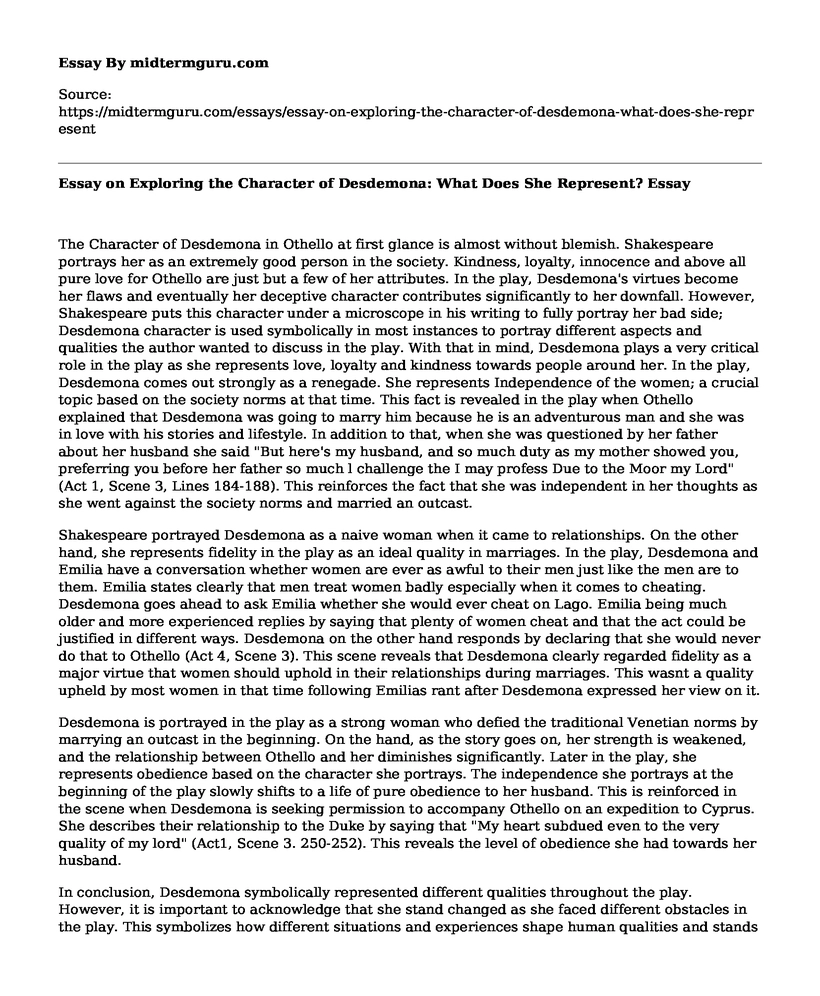The Character of Desdemona in Othello at first glance is almost without blemish. Shakespeare portrays her as an extremely good person in the society. Kindness, loyalty, innocence and above all pure love for Othello are just but a few of her attributes. In the play, Desdemona's virtues become her flaws and eventually her deceptive character contributes significantly to her downfall. However, Shakespeare puts this character under a microscope in his writing to fully portray her bad side; Desdemona character is used symbolically in most instances to portray different aspects and qualities the author wanted to discuss in the play. With that in mind, Desdemona plays a very critical role in the play as she represents love, loyalty and kindness towards people around her. In the play, Desdemona comes out strongly as a renegade. She represents Independence of the women; a crucial topic based on the society norms at that time. This fact is revealed in the play when Othello explained that Desdemona was going to marry him because he is an adventurous man and she was in love with his stories and lifestyle. In addition to that, when she was questioned by her father about her husband she said "But here's my husband, and so much duty as my mother showed you, preferring you before her father so much l challenge the I may profess Due to the Moor my Lord" (Act 1, Scene 3, Lines 184-188). This reinforces the fact that she was independent in her thoughts as she went against the society norms and married an outcast.
Shakespeare portrayed Desdemona as a naive woman when it came to relationships. On the other hand, she represents fidelity in the play as an ideal quality in marriages. In the play, Desdemona and Emilia have a conversation whether women are ever as awful to their men just like the men are to them. Emilia states clearly that men treat women badly especially when it comes to cheating. Desdemona goes ahead to ask Emilia whether she would ever cheat on Lago. Emilia being much older and more experienced replies by saying that plenty of women cheat and that the act could be justified in different ways. Desdemona on the other hand responds by declaring that she would never do that to Othello (Act 4, Scene 3). This scene reveals that Desdemona clearly regarded fidelity as a major virtue that women should uphold in their relationships during marriages. This wasnt a quality upheld by most women in that time following Emilias rant after Desdemona expressed her view on it.
Desdemona is portrayed in the play as a strong woman who defied the traditional Venetian norms by marrying an outcast in the beginning. On the hand, as the story goes on, her strength is weakened, and the relationship between Othello and her diminishes significantly. Later in the play, she represents obedience based on the character she portrays. The independence she portrays at the beginning of the play slowly shifts to a life of pure obedience to her husband. This is reinforced in the scene when Desdemona is seeking permission to accompany Othello on an expedition to Cyprus. She describes their relationship to the Duke by saying that "My heart subdued even to the very quality of my lord" (Act1, Scene 3. 250-252). This reveals the level of obedience she had towards her husband.
In conclusion, Desdemona symbolically represented different qualities throughout the play. However, it is important to acknowledge that she stand changed as she faced different obstacles in the play. This symbolizes how different situations and experiences shape human qualities and stands in different societies. This paper discusses three distinct qualities [Independence, Fidelity & Obedience] represented in the play that show the change stand by Desdemona as the play progressed
Cite this page
Essay on Exploring the Character of Desdemona: What Does She Represent?. (2021, May 26). Retrieved from https://midtermguru.com/essays/essay-on-exploring-the-character-of-desdemona-what-does-she-represent
If you are the original author of this essay and no longer wish to have it published on the midtermguru.com website, please click below to request its removal:
- Book Analysis: Everything Begins and Ends at the Kentucky Club
- Moby Dick Post Analysis Paper Example
- Critical Essay on Instances of Wisdom and Arrogance in 'Antigone'
- Critical Essay on Power By Tobias Wolf
- Literary Analysis Essay on Theme of Gift Giving in Beowulf
- Literary Analysis Essay on The Conference of Birds
- Critical Essay on Beowulf Poem Themes







